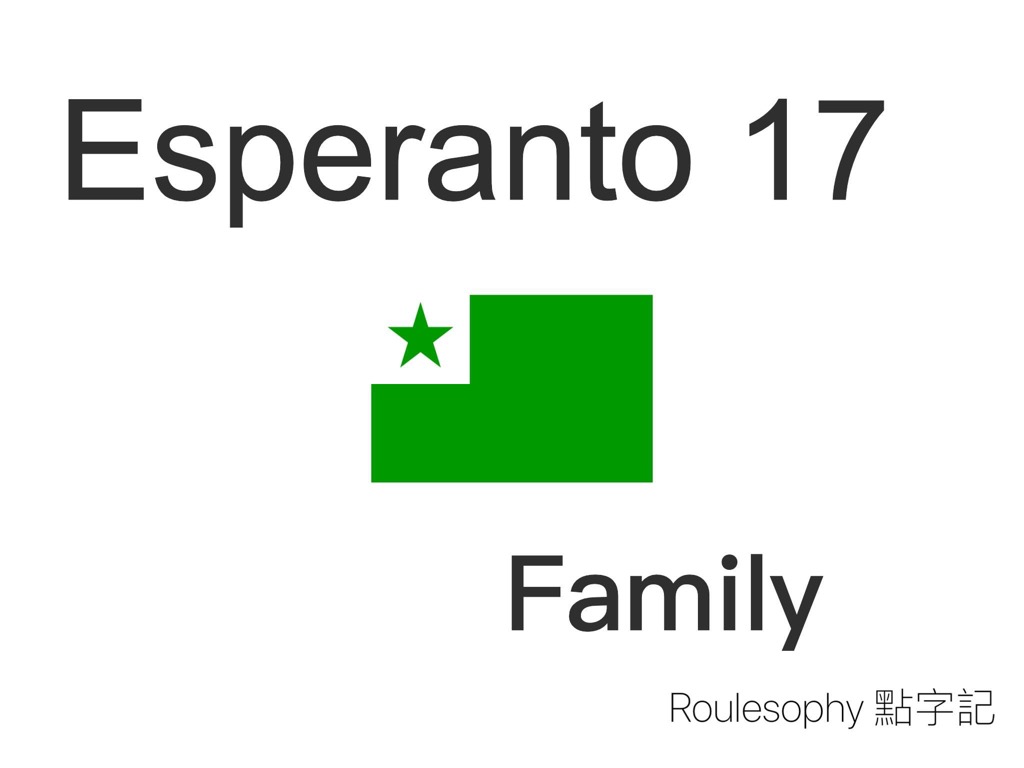Esperanto 17 - Family

這課學習家人和親戚的名詞。
溫習
文法規則
- 這課會學習到關於親戚的數個 affixes:
| Affix | Meaning |
|---|---|
| -in- | female |
| ge- | both sexes / any sex |
| bo- | in-law |
| pra | great- |
| -ĉj- | nickname for male |
| -nj- | nickname for female |
Section 1/3
| Esperanto | English | Comment |
|---|---|---|
| filo | son | filino: daughter |
| gefratoj | siblings | |
| familio | family | |
| onklo | uncle | |
| onklino | aunt | |
| kuzo | male cousin | kuzo: male cousin kuzino: female cousin |
| gekuzo | cousin | ge(both sexes) + kuzo(male cousin) |
| bebo | baby | |
| nevo | nephew | |
| nevino | niece | nevo(nephew) + -ino(female) |
| sia | her (own) / his (own) | 留意和 ŝia 的分別:lia / ŝia / ilia 指的人一定不會是自己,如果指的人是自己要用 sia。 |
例句
| Esperanto | English | Comment |
|---|---|---|
| Mi ne havas onklojn en mia familio. | I do not have uncles in my family. | |
| La filoj de la familio amas la bebon. | The sons of the family love the baby. | |
| Ĉu vi havas gefratojn? | Do you have siblings? | |
| Kiom da gekuzoj vi havas? | How many cousins do you have? | |
| Li estas mia nevo. | He is my nephew. | |
| Ĉu vi havas gefratojn? | Do you have siblings? | |
| Ŝi volas sendi leteron al siaj gepatroj. | She wants to send a letter to her parents. |
Section 2/3
| Esperanto | English | Comment |
|---|---|---|
| ĉambro | room | |
| ĝemelo | twins | 這裡的ĝe其實並不是 affix,字根本身已經是 ĝemelo |
| amiko | friend | amikino: female friend |
| koramiko | boyfriend | koro(heart) + amiko(friend) koramikino: girlfriend |
| edzo | husband | edzino: wife edzigi: to marry edziĝi: to get married geedzoj: spouses |
| sama | same | |
| prezenti | to perform / to present | 可以配搭 al 一起使用指示方向。 |
| aliulo | other person / someone else | alia(another) + ulo(person) |
例句
| Esperanto | English | Comment |
|---|---|---|
| Ĝemeloj havas la samajn gepatrojn. | Twins have the same parents. | |
| Ŝi estas la edzino de aliulo. | She is the wife of someone else. | |
| Mi prezentas al vi mian koramikon. | I introduce to you my boyfriend. | |
| Nia domo enhavas kvar ĉambrojn. | Our house contains 4 rooms. | |
| Mi iras kun mia amiko. | I go with my friend. | |
| Mia patrino estas la edzino de mia patro. | My mother is my father’s wife. | |
| Ŝi montras al ni nian ĉambron. | She shows to us our room. |
Section 3/3
| Esperanto | English | Comment |
|---|---|---|
| nepo | grandson | nepino: granddaughter, pranepo: great-grandson |
| avino | grandmother | |
| bofrato | sister-in-law | bo-(in-law) + frato(brother) |
| bofratino | sister-in-law | bo-(in-law) + frato(brother) + -ino(female) |
| bopatro | father-in-law | bo-(in-law) + patro(father) |
| bopatinro | mother-in-law | bo-(in-law) + patro(father) + -ino(in-law) |
| paĉjo | daddy | patro(father) + -ĉj-: nickname for male |
| panjo | mommy | patrino(mother) + -nj-: nickname for female |
| praavo | great-grandfather | pra-(great) + avo(grandfather) |
| praavino | great-grandmother | pra-(great) + avo(grandfather) + -ino(female) |
例句
| Esperanto | English | Comment |
|---|---|---|
| Paĉjo, kie estas panjo? | Daddy, where is mommy? | |
| La avino aĉetas pantalonon por sia nepo. | The grandmother buys pants for her grandson. | |
| Mia praavo venas el Ĉinio. | My great-grandpa comes from China. | |
| Mi vizitas mian bopatron. | I visit my father-in-law. | |
| Mia praavino venas el Rusio. | My great-grandmother comes from Russia. | |
| Panjo kaj paĉjo estas geedzoj. | Mommy and daddy are spouses. | |
| La edzo de mia fratino estas mia bofrato. | The husband of my sister is my brother-in-law. |
如果你覺得這個內容有用,不妨分享給你的朋友。
這是我的 Facebook、Twitter、Instagram 和 Threads,有興趣的話歡迎 Follow。
如果你認為我的文章有幫助,歡迎 請我喝一杯咖啡。
分類:
Esperanto
寫作日期: 2017-08-12